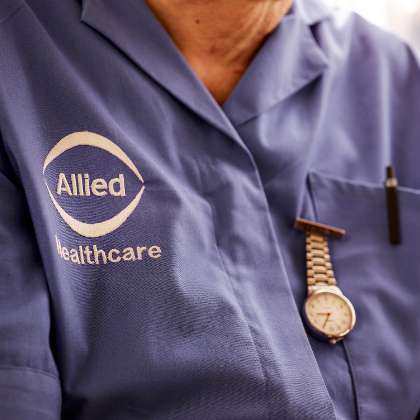A national watchdog has issued a public warning about the uncertain financial future facing an agency which sends carers into thousands of people’s homes.
The Care Quality Commission (CQC) is concerned that Allied Healthcare could collapse in the coming month.
The company provides carers to help elderly and disabled adults with everyday tasks such as washing, dressing, eating and managing their medication.
The CQC has written to more than 80 local authorities, including Brighton and Hove City Council, to highlight the situation.
The local branch, Allied Healthcare Brighton and Hove, looked after 186 people when it was last inspected by the CQC in April last year – and was given a good rating.
The branch, based at the Knoll Business Centre, in Old Shoreham Road, Hove, recently advertised for a registered manager – a key post.
And the CQC said that it had been integrating its East and West Sussex teams into the Brighton and Hove operation.
The company said that it was surprised and disappointed by the CQC warning, calling it premature and unwarranted.
But the CQC said that it was required to contact councils when it considered that a business could fail and that regulated services were likely to stop as a result.
This is known as a “stage 6 notification” under the watchdog’s “market oversight” function. It is intended to allow councils time to prepare and support the continuity of care services for people who rely and depend on a struggling provider.
The CQC’s chief inspector of adult social care Andrea Sutcliffe said: “Allied Healthcare announced its intention to apply for a ‘company voluntary arrangement’ (CVA) in April this year to restructure its debts.
“Through the CQC’s ‘market oversight’ function, we have been closely monitoring the situation and assessing the future viability of the company’s plans to determine whether continuity of care can be maintained for people who are receiving home care services from this provider.
“Allied Healthcare has been able to confirm funding until (Friday) 30 November 2018.
“However, we have not received adequate assurance that the company has, or will have, the ongoing funding or new investment necessary to ensure the business can operate beyond this date.
“We have encouraged Allied Healthcare to provide us with a realistic financially backed plan to support the future sustainability of the business and given them every opportunity to do so but they have failed to provide adequate assurance regarding future funding.
“It is now CQC’s legal duty to notify those local authorities where Allied Healthcare is contracted to deliver home care services that we consider there to be a credible risk of service disruption.
“We are doing this now to give local authorities as much time as possible to plan for maintaining continuity of care for people relying upon services from this provider should this be required.
“Local authorities have a statutory duty to ensure continuity of care for everyone using an adult social care service in the event that it ceases to operate.
“On Monday 5 November, we wrote directly to all 84 local authorities affected to advise them of this situation.
“I understand this is a very unsettling time for everyone who uses Allied Healthcare’s services, their families and loved ones and staff.
“We will continue to work closely with Allied Healthcare and all of our partners – the Department of Health and Social Care, the Local Government Association, the Association of Directors of Adult Social Services and NHS England – so they can inform the organisations responsible for commissioning people’s care to make sure appropriate action is being taken in the interests of people’s continuity of care if this proves necessary.
“It is of course possible that the company is able to avoid service disruption and, if that is the case, we will revise our position accordingly.”
Allied Healthcare said: “We are surprised and deeply disappointed by CQC Market Oversight’s decision, which we regard as premature and unwarranted.
“We have demonstrated throughout our discussions with the regulator that Allied Healthcare’s operations are sustainable and safe, that we have secured a potential replacement of our credit facility, that there is no risk to continuity of care and that we have a long-term business plan in place that will continue to deliver quality care across the UK.
“The CQC has disregarded these assurances in spite of the robust evidence we have provided.
“By issuing a stage 6 notification, the CQC is putting significant pressure on already stretched and pressurised local authorities and clinical commissioning groups.
“Continuity of quality care is our number one priority. We will continue to provide the services entrusted to Allied Healthcare and will work closely with all commissioners of care throughout this period.”
Allied Healthcare was sold to the German asset manager Aurelius Group for £19 million in 2015. The next two biggest home care providers, City and County and Carewatch, are also owned by private equity groups.
According to a report in the Daily Mail today (Wednesday 7 November), councils like Brighton and Hove may have to find alternative carers for vulnerable adults with fears that some could “slip through the net”.
And, the newspaper said, “charities described the potential collapse as indicative of a social care system in crisis”.
It quoted George McNamara, of the older people’s charity Independent Age, as saying: ‘This is a deeply worrying time for the thousands of older people and their families up and down the country who rely on Allied Healthcare as a vital lifeline of care and support.
“The Government must play an active role in bringing together all parties and, if necessary step in, and do all possible to ensure older people do not become the victims of a broken system.”
According to the CQC, Allied Healthcare is responsible for up to 10 per cent of all home care services in some council areas.
The company employs more than 8,000 domestic and health care staff to look after 13,000 people across the country.
Some currently pay for their own care but may turn to the council should Allied go bust.
The Mail quoted Age UK director Caroline Abrahams as saying that patients, particularly older and disabled people, were paying an “increasingly heavy price” for workforce shortages and inadequate funding of social care.
She said: ‘‘It’s bad enough when a care home operator gets into trouble but in some ways it is worse still when this happens with home care because the population of those in need is highly dispersed and the risk of overlooking a vulnerable older person is greater.”
The newspaper also quoted Allied chief executive Luca Warnke blaming rising labour costs, including an increase in the minimum wage, which had added £65,000 a week to its payroll.
The company also blamed council funding cuts and a potential £11 million bill for backdated “sleep in” payments to workers who provided overnight care after a change in government policy.
Allied Healthcare made an operating loss in 2016 and had outstanding loans of £16.5 million.
The Mail quoted the former pensions minister Baroness Altmann as saying: “Private equity groups and hedge funds are playing financial football with people’s lives.”











Perhaps Caremark could take over their workload and staff if Allied closes.